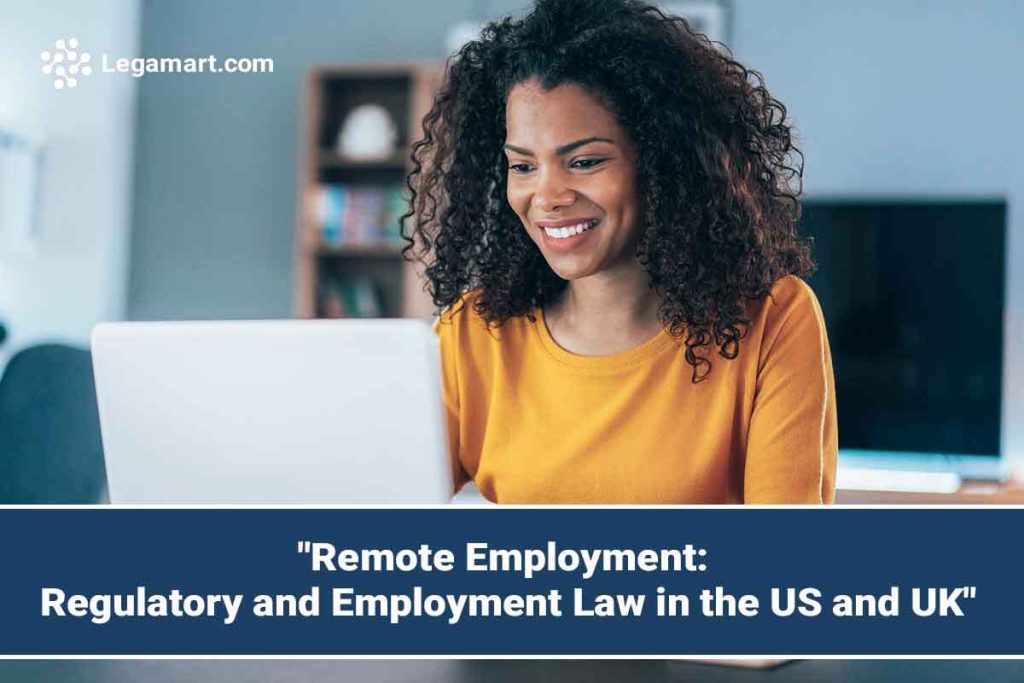- Introduction
- Checklist of Factors Affecting Remote Employment in the US and UK
- Applicability of Pay and Labor Law on Remote Employment in the US and the UK
- What Jurisdiction Laws Apply to Remote Employment in the UK and UK?
- Conclusion
- Frequently Asked Questions
Introduction
During the COVID-19 pandemic, several companies required their employees to work remotely, leading to workplace space transitions. Most workers and employers speculated that significant portions of their work could be accomplished remotely to stay relevant within the workspace and enhance productivity.
Due to the transition to working from home, many employers and employees have experienced legal repercussions. Taking these issues into consideration, we will examine in this article what factors affect remote employment within employment law, the applicability of pay and labor laws, and the various jurisdictional laws that apply to remote employment, comparing two jurisdictions- the United States and the United Kingdom.
Checklist of Factors Affecting Remote Employment in the US and UK

Here are some factors that come up when remote employees work in a different jurisdiction than their home jurisdiction and factors that affect Regulatory and Employment law in the US and UK
Worker Locale
There are several factors to consider when a worker works from a place different from the employer’s corporate office location.
Employee’s Location within the US
Employers and employees within the United States must consider various employment legislations of the state where the workers reside, although the Federal laws on employment apply to all states. These legislations regulate the relationship, wages, and other employment terms in general and in specific.
Similarly, when a worker decides to relocate to another state, employers are expected to consider labor laws and responsibilities to the employee’s current status in the new state. These include earnings, payday regulations, disability asylum, vacations, and employee bonuses. Another interesting view is that US recruiters whose staffers relocate to another country must also comply with the other nation’s statutes on employment.
Employee’s Location within the UK
When a worker moves from one state of the United Kingdom to another, it will not affect their employment rights because England, Wales, and Scotland have the same statute on employment. Except for the employee moving to Northern Ireland, the Northern Ireland Government has different employment laws.
All matters about remote employment terms fall under the UK and British Employment Law. If an employee functions remotely abroad for a UK recruiter, they will maintain career rights in the UK. Non-UK nationals who have come to work in the UK also acquire employment rights under UK law.
Tax and Corporate Concerns

Concerns in the US
In the United States, job recruiters conserve and expend taxes in the region where the staffer works, even if the employer has no enterprise place. So if a worker functions remotely and relocates to another district, the employer has to pay taxes in the worker’s new district.
To perform this, the employer must enlist the corporation with the tax authority of the state where the employee lives, retain and remit taxes by the tax legislations and regulations of that state. For example, employees in Texas are liable to tax payments if they work in Texas, even if the corporate office is in New York.
Concerns in the UK
A worker’s tax rate does not alter if they operate from home and change locations within the United Kingdom unless they move to or from Scotland. Such a shift could have tax significance because the Scottish Government has the authority to set a more varied revenue tax rate than the rest of the United Kingdom. Nonetheless, the worker has to acquaint the tax authorities if they have relocated to or from Scotland, and the tax procedure will be adjusted so that the employer need not take any action in this situation.
Data Privacy
Every country has data protection regulations, and remote employees are bound to abide by them. These regulations determine how personal data can be transferred out of the country and how to protect it in the new location. Employers while involved in remote employment must be aware of data privacy laws applicable in remote employment and local restrictions on monitoring data and the use of networks. Breaching and non-compliance with those laws have consequences.
Juggling between your living and work jurisdictions can be challenging, so make sure you read your contract carefully and discuss important clauses with your employer and an experienced lawyer who can help you understand the pros and cons of specific contract clauses, but finding an experienced lawyer can be challenging in itself. With LegaMart, you can easily schedule a consultation call by selecting a lawyer from our LegaMart directory, giving you the freedom to save time, money, and energy on your contract review.
Data Protection in the US
The US has no unified data privacy law. There are varieties of federal and state laws which altogether form piecemeal data protection. This approach can epitomize the diversity of data laws as the required data protection standards vary from state to state.

Data Protection in the UK
The primary UK legislation governing data protection is the Data Protection Act 2018 (DPA). The DPA reflects the General Data Protection Regulation (GDPR). This legislation governs corporations that carry out enterprises within the EU and retain data on EU citizens.
Intellectual Property
Ownership issues regarding intellectual property, such as patents, trademarks, copyright, and designs, are all subject to local laws of where the remote worker works. And for such, the employer has to be fully aware. Although the applicable legislations in the UK and the US are similar, there are areas of divergence. Here are some of them:
- Both nations adhere to the idea of originality.
- In the UK, it is not necessary to register the copyright; on the other hand, it is essential to register the copyright in the US.
- The UK and the US are the parties to the Beijing Treaty of 2012, Singapore Treaty (2006), and Patent Cooperation Treaty (1970).
- The UK is the party to the Madrid Agreement (1891), but the US is not. The treaty seeks to protect a mark in various countries by obtaining an International registration.
Anti-Discrimination Laws
Anti-Discrimination Laws on Remote Employment in the US
Authorizing staffers to work remotely could subject a firm to the entreaty of anti-discrimination legislation in the states where they work. The employer should therefore be aware of the statutes to which they are subject and understand the laws, regulations, and applications of such laws in each jurisdiction in which their employees operate. In the United States, anti-discrimination laws differ.
UK Anti-Discrimination Laws for Remote Employment
Age, disability, gender equality, marriage and civil partnerships, pregnancy and maternity, race, religion or belief, sex, and sexual orientation are protected by anti-discrimination laws in the UK. These laws also protect employees, job applicants, and other categories of protected individuals from harassment (directly or indirectly). The Equality Act 2010, Protection from Harassment Act 1997, and Trade Union and Labor Relations (Consolidation) Act 1992 are some applicable laws.
Least wage and overtime, varied earnings, reports, and break period
Issues like what the minimum wage in each work location should be, the compensations for overtime work, how the break period of a remote worker should be, the mode of reporting activities, and the duties of the employers in response to those issues are all matters of concern.
In the US, the minimum wage, overtime earnings, and the like are all determined by federal law – Fair Labor Standard Act, and enforced by the US Department of Labor and other state laws.
While in the UK, it is determined by the UK Minimum Wage Rate, and no worker can be paid less than the mandatory pay rate, although the age range is applicable and applies to all workplace classes.
Residence Office Expense and Technology Expenses
Employers must consider the necessary equipment the employees need to carry out their work. Examples are laptops, the internet, cell phone, software, printers, pens, paper, desks, chairs, and so on. However, employers must not neglect local laws on expense reimbursement in different regions.
Applicability of Pay and Labor Law on Remote Employment in the US and the UK

Pay and Labor Law Applicability on Remote Employment in the US
Employers in the United States must comply with the pay and labor legislation of the state where their workers reside. Similarly, when an employee relocates to another state, employers are duty bound to consider labor laws and responsibilities to the worker’s current status. These include minimum earnings, revenue vouchers, payday regulations, remuneration release, disability asylum, overtime, vacations, and employee bonuses.
As per remote work rules, employers must comply with worker compensation laws. In some states, these laws do not limit employer liability to injuries at a specific time or location. US employers whose workers move to another nation must likewise comply with the other nation’s employment laws, including statutes on termination and advantage contributions.
Pay and Labor Law Applicability on Remote Employment in the UK
The fact that a worker moves from one fraction of the United Kingdom to elsewhere will not normally implicate their job or career rights as England, Wales, and Scotland have the same statute. However, the Northern Ireland Government is accountable for workers’ rights in Northern Ireland.
Before courts in England, Scotland, and Wales can have jurisdiction over claims, a worker must have a vital connection to the UK and British Employment Law.
Applicable circumstances entail where the worker was employed and paid, where they live, where they pay taxes, the legislation underlying the employment contract, where the employee is located, and whether the employment liaison has existed in the UK.
If a worker functions remotely abroad for a UK recruiter, it is apparent that they will maintain career rights in the UK, especially the laws on employment termination and prejudice. They are at liberty to acquire vocational rights in the country where they work. Non-UK nationals who come to work in the UK also acquire employment rights under UK law.
What Jurisdiction Laws Apply to Remote Employment in the UK and UK?

Applicable Jurisdictional Laws on Remote Employment in the US
There is no particular statute regarding the state’s employment laws to govern remote employment. It has been a challenge whenever issues to that effect arise. The courts then apply what we know to be the “choice of law.” Although the law where the worker operates is applicable, this is often not the case. The Fair Labor Standards Act (FLSA) covers all US workers where they work.
A practical instance is where an employer has his office location in New York. Crystal clear, the employer is subject to New York employment laws. Peradventure, the corporation follows the hybrid workplace tide and engages some employees to work from home. Three employees who reside in Connecticut, New Jersey, and Pennsylvania, respectively, are to work from home.
In the scenario above, remote employees initiate abidance responsibilities in the states where they work rather than where their employers are based. It means that our speculative employer, who was once answerable to the employment laws of New York, is now subject to the employment laws of more states. By permitting workers to work remotely, an employer has opened itself up to lawsuits in foreign jurisdictions where the organization’s workers are working.
To confer jurisdiction against a firm in the United States, a court must conclude that there is either extensive or distinct jurisdiction over it. Distinct jurisdiction refers to a court that exerts special jurisdiction over a party arising from that party’s special contacts with a jurisdiction.
Applicable Jurisdictional Laws on Remote Employment in the UK
The UK does not retain particular legislation about remote employment. The same statute applies to both employees within a designated office location and remote employees. The fact that an employee moves from one part of the UK to another does not affect their remote employment rights as the same laws apply in England, Scotland and Wales. However, the Northern Ireland Government is responsible for labor rights in Northern Ireland.
Conclusion
Without a qualm, remote employment is stacked with its pros and cons, evaluating the remote employment laws and their several implications. Therefore, employers and employees should take cognizance of these implications to help determine their firms’ productivity, significance, and efficiency.
Frequently Asked Questions
Can a US citizen work remotely in the UK for an American company?
You can work remotely in the UK if you are a United States citizen or from an EU country. You can stay for 90 days in a 180-day window, but if you plan to stay there for more than three months, you must apply for a visa.
Can a UK citizen work remotely in the US for a UK company?
In the UK, there are no constraints on whether you can work remotely for a corporation in another nation, including the US. Nonetheless, you must pay income tax to the UK and fulfill tax liability regulations. You can either function as an independent contractor or a worker of a US company.
Do employees have the right to remote work?
There is no universal answer to the question. It depends on several factors — local laws in the country your workplace is based and many more.




